Spider-view: "Mother's Day" (Spider-Man 2099, Part 6)
This standalone issue nicely gives insight into Miguel O'Hara's family history and the way parents influence their children
—by Nathan on September 28, 2025—
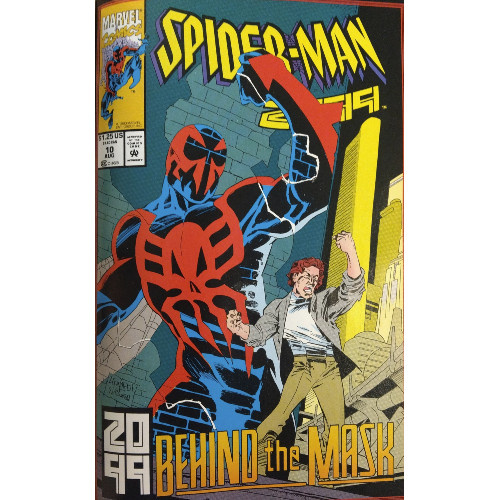
It's back-to-back-to-back-to-the-future as Rick Leonardi returns in our next look at Miguel O'Hara’s world! Up until now, I've reviewed the periodic Spider-Man 2099 arc or issue, so it's nice to have had the opportunity to have done a few of these in a row.
I wish I could say I got this blog out in time to celebrate the holiday this issue is titled after, but alas, timing was against me. It's actually not clear whether this issue takes place on Mother's Day or if it's just called that because it features a day that's centered on a mother. Miguel and Gabe's mother, in fact.
In Spider-Man 2099 #9, Miguel had just gotten home from traipsing around the depths of Downtown when Gabe arrived to inform him their mother had collapsed. It's not quite the same dramatic cliffhanger as tumbling into the depths of old New York or being kidnapped by a man calling himself the Vulture, but we'll take whatever suspense we can get here, right? The discerning reader reaching the end of issue #9 the first time may turn their head a little. This is the first we're hearing of a mother; neither Miguel nor Gabe have referenced parents previously. Don't worry, we're about to hear more about her…and a whole lot from her too.
"Mother's Day"
Writer: Peter David
Penciler: Rick Leonardi
Inker: Al Williamson
Colorist: Steve Buccellato
Letterer: Rick Parker
Issue: Spider-Man 2099 (vol. 1) #10
Publication Date: August 1993
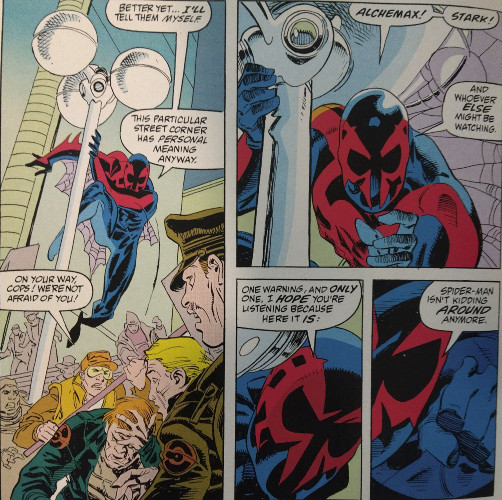
In this issue, we find another great reason why Miguel is the right guy to be Spider-Man: he's got parent problems.
If you're Peter Parker, your parents supposedly died in a plane crash only to seemingly resurface years later (and let's not forget when they were believed to be enemy spies at one point too). If you're Miguel O'Hara, your father abused your mother and held you to impossibly high standards while ignoring your brother. As a result, you hated him even after he died, and your mom seems to have developed some kind of mental instability that you now have to deal with as well, along with your brother and fiancee.
Conchata O'Hara, introduced briefly to readers in the previous issue, becomes a central figure in this tale when Miguel, Gabe, and Dana pay her a visit at the wellness home she lives in. She seems sick with something, perhaps mentally, leading her to emotional outbursts that seem to cry for attention from her sons. David offers limited details to, hopefully, flesh out Conchata's backstory and her condition in future storylines. All we know is that (a. she was verbally and physically abused by her husband George and (b. has a strained relationship over Miguel for being too much like his father, something implied to have been a subconscious reaction of Miguel's part. David offers enough details to make for an engaging character but also limits his approach to make you want to read further and learn more about Conchata in future issues.
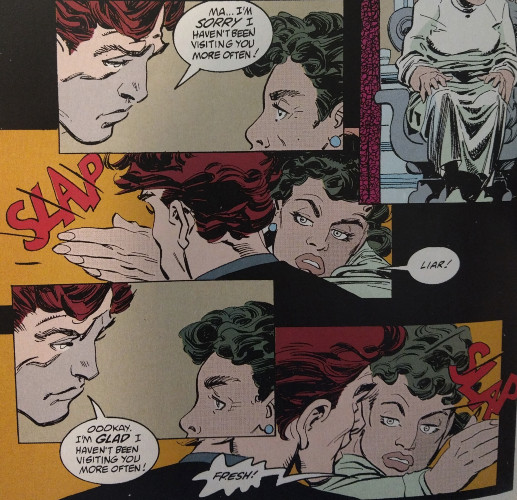
Miguel and Gabe's mom lives at this interesting intersection of sympathy and frustration. On the one hand, you sympathize with the hand she was dealt, the physical abuse by her husband as she tried to protect her sons. It has left her marked, at least internally, and jaded in some respects. A flashback allows insight into the kind of person she was when she was raising the kids, and though David comments on it briefly, he and Leonardi choose to show the difference between who Conchata was when was younger and who she is now. A person who behaved in a vibrant and loving way was left broken, often lonely and desperate for attention. Miguel calls her "Crazy Lady," and though it isn't the most polite epithet, you feel his own frustration bubble up as he tries to navigate her way of thinking and acting.
Gabe comes across as an interestingly written character here as well. Though their mom loved both boys, she seems more drawn to Gabe in the flashback, whereas their father (more on that later) acts prouder of his oldest son. Gabe recognizes the ways Miguel defended him from their father, but he's also frustrated with how jaded Miguel is as well, particularly towards their mother. You get the sense he's been Conchata's primary caretaker, loving her in a way that Miguel has been unwilling to and growing somewhat resentful of the brother he believes should be more responsible.
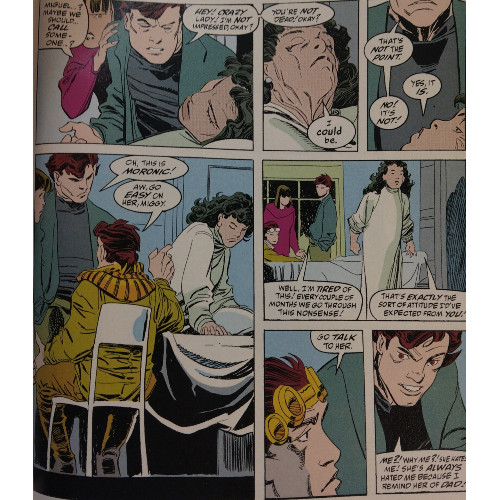
David uses a few flashbacks to dig into the relationships between the boys and their parents when they were younger. Where another writer may show a full story through flashbacks over an extended period of time, David wisely minimizes his peeks into the past, showing wildly different moments in Miguel and Gabe's history. There's quite the jump between the flashback where Miguel protects Gabe from their father's abuses towards their mother, even as their father extols Miguel's praises, and a later scene where Miguel openly critiques his father, who replies coldly. A lot of time has passed and things have shifted between the two men.
The reader is allowed to make inferences from these scenes to help form our understanding of the relationship between these four family members. Is it because of the abuses that Miguel rejected his father's pride in him and drove a rift between them? Could Conchata's attention towards Gabe stirred jealousy in Miguel? Clearly, love exists between the mother and her sons, but Conchata's love for Gabe feels more tangible…has that, coupled with his mother's outbursts, made Miguel a cynic? Perhaps it's why he's failed to care for his mother the way Gabe has.
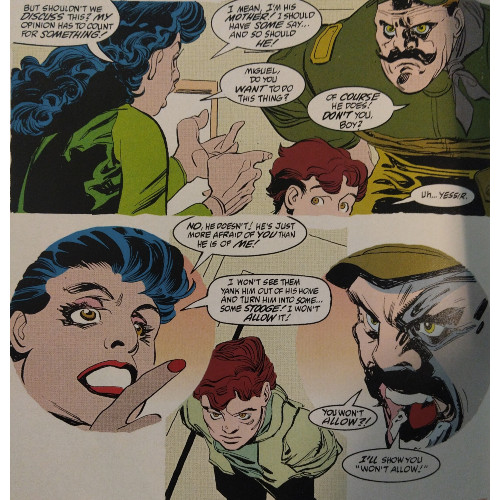
This is one of those narratives where you desperately want Miguel to be the bigger man, to set aside the past and be more understanding of his mother. Maybe not call her "Crazy Lady" as much as he does, if at all. You wish mother and son could talk, understand each other a little better. No resolution happens in this issue, but I feel it's intentional. David is sewing family conflict here, and those wounds are not so easily healed over a single conversation.
Drawing parallels between Miguel and Peter Parker again, we obviously see that Miguel's relationship with his parental figures is far different than that of Peter's relationship with Uncle Ben and Aunt May. At one point, Conchata tells Miguel that he should be more like this hero she worships, that Spider-Man fellow who's been swinging around. A true hero that one! Conchata has even converted a whole closet into a shrine for the Web-Spinner. David draws humor from the same well Stan Lee drew from, twisting a mother's ignorance to achieve a different yet remarkably amusing effect. Whereas Aunt May was always grateful that Peter was never like "that awful Spider-Man," Miguel's mother wishes her son was more like the colorful superhero, hilariously oblivious to who Miguel really is. Miguel even tries to persuade her that he is Spidey, but Conchata laughs him off and ignores his pleas for her to listen.
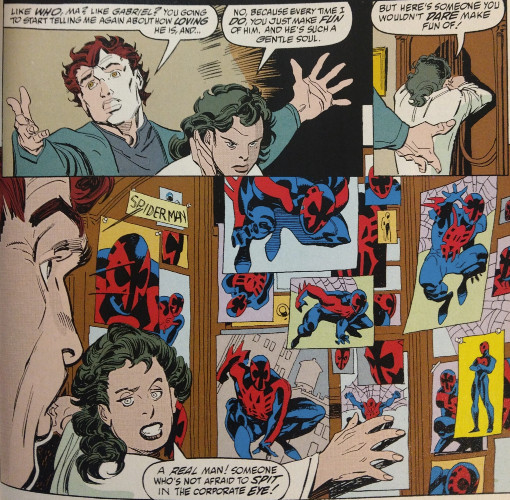
Family relationships are an integral theme, specifically parent/child relationships, in Spidey comics. Whether it's Peter and Aunt May, Harry and Norman Osborn, MJ and her father Philip, or heck, three generations of Jamesons (Jay, Jonah, and John), these dynamics have created an assortment of powerful yet conflict-driven storylines over the decades. For Peter in particular, there's always been the struggle of Aunt May learning and being harmed by knowing his secret identity (and let's forget for a moment when she knew for a few years in the early 00s), driven by his love and protective feelings for her. Miguel casts all that aside in this issue. He's not concerned about how his revelation will affect his mom; he just wants her to understand that he really is the superhuman she admires so much, hoping in will stir love in her for him. But she brushes him aside, compounding the problem.
Miguel's conflict with his father can also be seen as a twist on Peter's relationship with Uncle Ben. Where Ben always pushed Peter to try his hardest and to become a better man, George O'Hara pushes his son because of his own pride, to shape Miguel into a version of himself, at the expense of his other son. He's introduced as a spiteful, indignant man who focused less on the all-important missive of "power and responsibility" and more on his son's personal success. He wants a "mini-me" version of himself, has decided Gabe doesn't fit that mold, and determine that Miguel will be the kid he can force feed his intentions. Ben famously dies protecting his wife and home from a burglar; we're not told how George dies, but it's not as a hero. I imagine David wants us to believe George passes as a bitter man, clutching onto his pride in the face of losing his family.
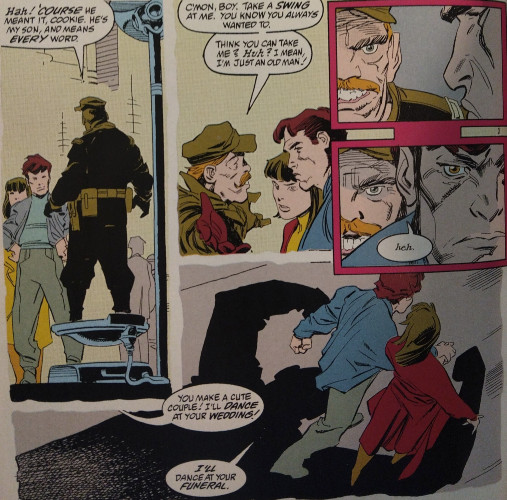
We're left with a rather complicated issue, then. On the surface, what is teased as familial conflict between parents and children is, underneath, deeper than an initial reading might bring to mind. I would argue that I feel Miguel's reactions to his parents, while somewhat understandably negative, pushes the boundaries of harshness at moments. A monologue he delivers at the end makes it clear he wanted to see his father suffer at the hands of time, a type of repayment for whatever he forced Miguel and their family through; George ruined that plan by dying young. We've seen that Miguel is, as the cliche goes, "not your father's Spider-Man" (he'd be more your great-great grandson's, I guess?). He's killed the Specialist, allowed the Vulture to fall to his doom, and wished his father had grown old and miserable. The spark of astonishment he expressed at his own brutality when fighting the Specialist appears gone. Miguel seems to want to embrace this darker, slightly more malevolent side of himself.
Miguel himself indicates he's seen the same light other people have–his mother, Kasey, his brother to a certain extent. All the worry-warting over being Spider-Man has vanished. Smashing a Public Eye security camera near the end of the issue, Miguel comes to the realization that he will embrace what people want him to be. He's been blinded too long. Maybe some of this, it's implied, is him finally reacting to the mold his father wanted to shape him within, using his strength to break from one person's dreams for him to be reformed by a different perspective. But this time, it's Miguel who chooses to become the hero the people of Nueva York want him to be, the hero his mother wants him to be. Forget being formed by whatever spark his father tried to force out of him; Miguel is now becoming what people actually see in him, his heightened eyesight finally adjusting to the world around him…and to who he is as a man and hero.